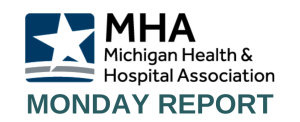
 The Senate Appropriations Department of Health and Human Services Subcommittee convened March 28 to hear testimony on the state’s opioid settlement dollars. Testimony began with Amy Dolinky, technical adviser for opioid settlement funds at the Michigan Association of Counties (MAC), providing an overview of the MAC’s role in supporting the distribution of settlement dollars through county governments. She stressed the importance of utilizing the evidence-based strategies and principles outlined by the Johns Hopkins Bloomberg School of Public Health for spending of opioid settlement dollars. Next to provide testimony was Dr. Natasha Bagdasarian, chief medical executive, and Amy Epkey, senior deputy director of financial operations, both representing the Michigan Department of Health and Human Services (MDHHS). MDHHS used the opportunity to provide an overview of opioid settlement spending, to date.
The Senate Appropriations Department of Health and Human Services Subcommittee convened March 28 to hear testimony on the state’s opioid settlement dollars. Testimony began with Amy Dolinky, technical adviser for opioid settlement funds at the Michigan Association of Counties (MAC), providing an overview of the MAC’s role in supporting the distribution of settlement dollars through county governments. She stressed the importance of utilizing the evidence-based strategies and principles outlined by the Johns Hopkins Bloomberg School of Public Health for spending of opioid settlement dollars. Next to provide testimony was Dr. Natasha Bagdasarian, chief medical executive, and Amy Epkey, senior deputy director of financial operations, both representing the Michigan Department of Health and Human Services (MDHHS). MDHHS used the opportunity to provide an overview of opioid settlement spending, to date.
Last to provide testimony was Dr. Cara Anne Poland, chair of the Opioid Settlement Commission (OAC), Hon. Jamie Stuck, OAC Commissioner representing Tribal Nations and Tara King, coordinator of the OAC. The testimony from the OAC centered around the challenges and barriers the OAC encounters coordinating opioid settlement work with MDHHS. Additionally, the OAC representatives provided an overview of the soon-to-be-released OAC 2024 Annual Report.
The MHA submitted written testimony advocating for the distribution of opioid settlement funds to communities most impacted by opioid and substance use disorder. The testimony also included a list of specific ways the legislators could allocate funds to improve treatment options for patients impacted by opioid and substance use.
Members with questions should contact Lauren LaPine at the MHA.


 The Affordable Care Act is Back on Stage: What to Expect
The Affordable Care Act is Back on Stage: What to Expect
